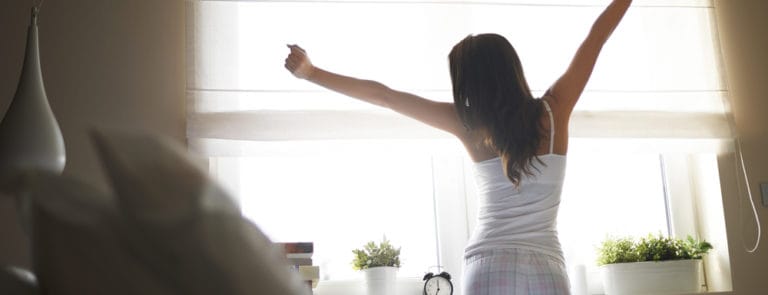10% off £35
How to fall asleep more quickly
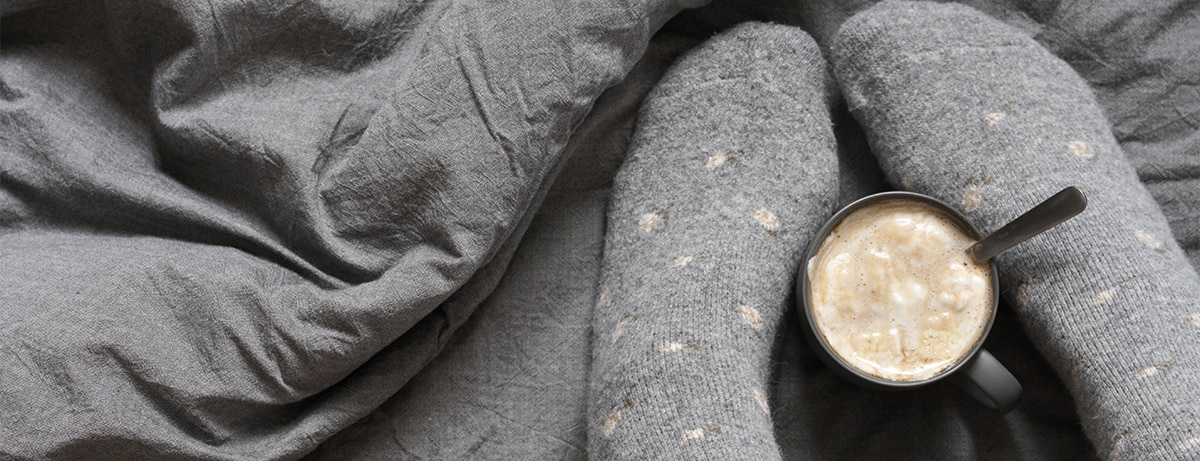
How long does it take you to fall asleep at night? 5 minutes? Or does it take you 30 minutes or more to drift off into your nightly slumber?
With the time it takes you to nod off (also called sleep latency) being an important indicator of sleep health, we’ve shared a few tips on how you can get to sleep faster. Sleep latency is the length of time it takes you to go from your head hitting the pillow to being asleep.
The average amount of time is between 10 and 20 minutes,1 with research suggesting a sleep latency of 10 to 15 minutes is more likely to lead to a good night’s rest.2
But what if it regularly takes you longer to drop off?
How to fall asleep faster
If you’re struggling to nod off, learning how to go to sleep faster can seem like an impossible task. But there are some simple techniques that can help you…
Step 1: Get your bedroom ready for sleep
It may take you some time to find the perfect sleep environment, but you’d be surprised at how much your bedroom impacts your overall ability to fall and stay asleep every night.
While you may think it’s a slumber time haven, in reality, this may not be the case, with everyday life preventing your bedroom from being the place you associate with relaxation and sleeping.
One of the most fundamental elements of falling asleep more quickly is making sure your surroundings (AKA your bedroom) is set up to enable this.
Fortunately, you don’t have to make massive changes to your bedroom to make it more sleep-friendly.
You just need to make some subtle changes here and then, including:
- Keeping clocks out of view - It will prevent you from obsessing over time.
- Removing electronic devices from the room - Allow yourself to fully switch off.
- Choosing a blackout blind or curtains - For example, if you have a street light outside your window, blackout blinds or curtains will block it out. Or you could try wearing a sleep mask.
- Decluttering your bedroom - It’ll help clear your mind too.
- Keeping your room cool - A temperature of around 16 to 18°C is the optimum setting.3
- Reducing the volume - Some people find it useful to wear earplugs to block out noise. Others find playing gentle music or white noise helps them to drift into a more restful state of mind.
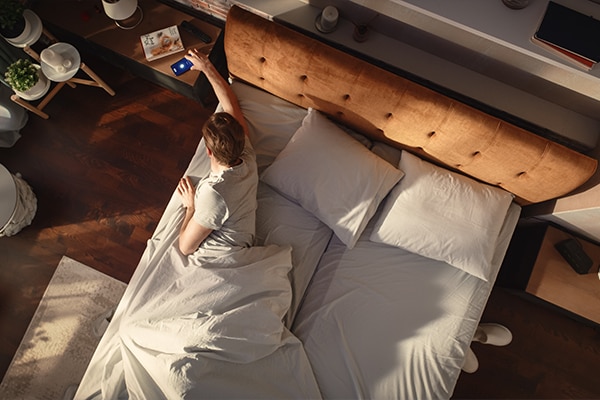

Step 2: Get your body ready for sleep
As obvious as it sounds, if your body isn’t ready for sleep, you’re likely to find it more difficult to drop off. If you feel all fired up from a busy day at work or just a busy day generally, it can mean it takes longer for you to wind down and feel relaxed, if at all.
If you’re one of those people who struggles to drop off, then it’s essential you make sure your mindset is in sleep mode around bed-time and your body will naturally follow.
Plus it’s also important you generally start to wind down the later it gets, so that your brain and body get chance to slow down and unwind too.
Here are a few things you can do to help you slip into slumber mode:
- Avoid drinking caffeine close to bedtime - Reduce your consumption of (or cut out) stimulants, especially in the evening.4
- Shun alcoholic drinks in the lead up to bedtime - Even just a couple of drinks can impact your sleep quality.5
- Eat dinner earlier - Leave enough time for your stomach to digest food before you lie down for the night.6 And if you limit your calorie intake to earlier in the day it also means there’s more time to burn off any excess energy.
- Take a warm bath or shower before bed - The dip in your body temperature post-bath can fool your body into thinking you have gone from daytime to night-time. Some say this can increase the urge to sleep.7
- Add some regular exercise into your routine - Exercise is great for relieving stress and anxiety, which can help with falling asleep faster. However, if you’re exercising in the lead up to bedtime, choose relaxing, low-impact exercises, such as yoga, not adrenalin-pumping activities, such as HIIT.
- Switching to low level lighting a couple of hours before bed can also help, plus limiting exposure to blue light and devices (devices = stimulation, plus blue light can delay melatonin onset)


Step 3: Get your mind ready for sleep
Working long hours. Trying to keep up with a hectic family life. And then managing all of the other stresses life throws at you can all contribute to difficulties falling asleep.
And if you’re on your laptop or phone in the evening or doing high-energy exercise 1 or 2 hours before bed, your mind simply isn’t going to be in sleep mode by the time you do get into bed, regardless of how tired you may feel or you’d like it to be.
Here are a few ways you can help wind down your mind ready for bedtime:
You could try the 4-7-8 breathing technique.8
Some advocates of this method claim it helps people fall asleep faster. Simply follow this breathing pattern:
- Breath in for four seconds.
- Hold the breath for seven seconds.
- Breathe out for eight seconds
Changing your perspective on something that’s concerning you can help deal with any worries before you get into bed.
Reframing can prevent you falling into a negative cycle of thoughts that can stop you falling asleep.9
It takes these three actions:
How to reframe unhelpful thoughts
- Recognise the thought – for example, you may be worrying about work that you hadn’t managed to finish that day
- Challenge it – for example ‘I’m catastrophising, probably because my brain is tired. Do I actually need to get it all done? What would happen if I didn’t? Is that even realistic?’
- Replace it with a more balanced perspective – for example ‘I can prioritise what needs to be done tomorrow. If I don’t get to it all, that’s ok. It may be frustrating, but it won’t be disastrous. I’ll be able to deal with it.’
It can take a few weeks to get the hang of this method and see the results. But it promises to help you fall asleep really quickly, so it’s worth a try! It is important to note that this technique has gone viral as a popular way to get to sleep, however its not been proven to have any effects.
How to do the military method
- Relax your face muscles – your jaw, tongue, and the muscles around the eyes
- Drop your shoulders. Then take your arms down to your side too, one side at a time
- Allow your chest to relax
- Next, relax your legs. Start from the thighs and work down
- Now clear your mind. Focus on a relaxing vision for 10 seconds. For example, lying in a canoe on a tranquil lake looking up at a clear blue sky
- Repeat, “don’t think, don’t think, don’t think,” to yourself for a further 10 seconds
- You should drop off soon after
What to drink to fall asleep faster
So far, we’ve only mentioned the drinks to avoid. However, lots of people find certain herbal drinks can help them unwind and fall asleep, although at the moment there isn’t enough research to support this.
It’s also worth mentioning avoid consuming lots of liquid before bed as this can result in a full bladder and having to get up in the night to go to the bathroom.
If you’re looking for a natural sleep remedy, herbal teas are a popular option.
Summary
- Preparing your bedroom for sleep, e.g. getting rid of clutter, hiding clocks and making sure it’s the right temperature, can all help you fall asleep more quickly
- Your body also needs to be prepared for sleep too – considering what you eat and drink just before bed is central to this
- Breathing techniques, such as 4-7-8, and the military method can help put your mind in sleep mode and help you fall asleep faster
5 reasons why you can’t get to sleep
If you’re wondering why you’re spending a long time in bed trying to sleep (but not actually sleeping), it could be due to a number of things:
- Do you find yourself getting stressed out pondering how to sleep faster? Clock-watching and analysing why you’re not asleep can leave you tossing and turning even more. Yes, anxiety about the act of trying to get to sleep can end up being what’s keeping you awake.
- Is something about your sleep environment stopping you nodding off? Perhaps it's too hot in your bedroom? Or maybe the light isn’t dim enough? Or is your mattress uncomfortable? Is your messy room cluttering your mind? All of these things can impact the time it takes you to drop off.
- Irregular sleep patterns - Late nights and lazy lie-ins. Afternoon naps and all-nighters. It could be that your body clock is out of sync due to an irregular sleep routine.
- Your bedtime drink - There are two sleep-stealing beverages in particular – caffeine and alcohol. Maybe an evening caffeine-fuelled drink is interrupting your slumber? And that alcoholic tipple that feels so relaxing could also be causing sleep interference too….
- Struggling to relax - If you’re feeling overwhelmed, over-stretched and anxious, it can be a real mission to switch your brain off. Unfortunately, an overactive mind can cause you problems when you’re trying to get to sleep.11
Is it normal to take two hours to fall asleep?
Is it normal to take two hours to fall asleep?
The average time it takes people to fall into a good night’s sleep is between 5 and 15 minutes. But this isn’t the case for everyone. While sleep is a personal experience and taking a bit longer to fall asleep may mean nothing at all, if you regularly take 2 hours to fall asleep, it is important to speak to your GP to work out what may be stopping you sleep.
Or it could be that you’re getting too much sleep.
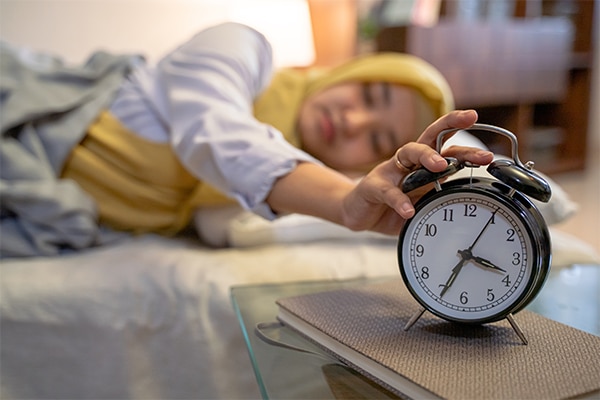

While being able to fall asleep the moment your head hits the pillow may sound like the stuff of dreams, falling asleep in 10-15 minutes is perfectly healthy and much more realistic! Making it happen instantly may not be achievable for everybody but there are techniques that can certainly make the whole process a lot quicker.
This includes the 4-7-8 method we mentioned above, which combines meditation and visualisation.12
One step on from 4-7-8 is Progressive Muscle Relaxation or PMR, which involves tensing and relaxing at least 16 muscle groups, from your toes all the way up to your forehead.
How to do PMR
- Tense the muscles in your toes and feet. Focus on feeling them scrunch up. Hold them for 4 to 10 seconds, inhaling as you do so.
- Exhale and completely release the tension in your muscles. Breathe slowly through your nose and out through your mouth for another 10 to 20 seconds, focusing on feeling your muscles and your body sink down.
- Repeat step two for the rest of your muscle groups i.e. your calves, thighs, hips, bottom, core, back, shoulders, biceps, chest, forearms, hands, neck, around the eyes and jaw.
- As you move through the muscle groups, notice any areas of your body that holding extra tension. Try maximally squeezing and then releasing, as many times as necessary to fully relax.
The key to doing both of these exercises and falling asleep more quickly is doing them on a daily basis. The more you do them, the more familiar you will be with what the steps are and how they make you feel.
You’ll also find that you naturally hone the routines as you get more used to doing them.
The main thing is that you repeat them every day and that you don’t let any other interruptions (e.g. your mobile phone or the TV) get in the way during or immediately after doing them as it will undo all of your hard work.
Summary
- Stress, a chaotic bedroom, irregular sleep patterns, plus many more things can influence how quickly you drop off
- On average, it takes between 5 and 15 minutes for people to fall asleep
- While it’s not possible to always fall asleep quickly, techniques such as 4-7-8 breathing and PMR can potentially help speed the sleep process along somewhat.
A final few words on how to fall asleep quicker
Unfortunately, we can’t just wave a magic wand and instantly fall asleep (if only we could!) But that doesn’t mean there aren’t certain changes we can make to help us get to sleep sooner.
It’s important to remember though that everybody is different, so what works for one person, may not work for the other.
Fortunately, there are lots of different techniques out there that can help you drift off more quickly. Many of these changes are really easy to embrace, it’s just a case of remembering to do them and refining them as you go along.
Where possible, start with one or two changes and then continue to build upon them.
If you find success with something, stick with it, and if you find something isn’t working, try something else until you develop a sleep regime that works for you.
Visit our Sleep & Relaxation Hub for more guidance on how to sleep well, including top tips and a quiz to find the products right for you.
For more in-depth support, you can speak directly with qualified sleep experts through a one-to-one video consultation for personalised and private advice.
What's stopping you sleeping?
Trouble sleeping? A poor night’s sleep impacts us all at some point in our lives but there are things we can do to improve the quality of our sleep. In this episode we discuss:
- The importance of sleep on your health and wellbeing
- Tips on how to get into a sleep rhythm.
- Changes you can make to ensure you get a better night's sleep.
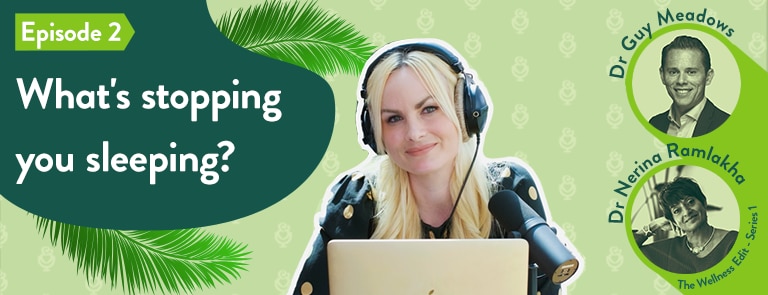

- D. Thomas, W.M. Anderson, Multiple Sleep Latency Test (MSLT), Editor(s): Clete A. Kushida, Encyclopedia of Sleep, Academic Press, 2013, Pages 96-99, ISBN 9780123786111, https://doi.org/10.1016/B978-0-12-378610-4.00146-7.
- Allen SF, Elder GJ, Longstaff LF, Gotts ZM, Sharman R, Akram U, Ellis JG. Exploration of potential objective and subjective daily indicators of sleep health in normal sleepers. Nat Sci Sleep. 2018;10:303-312
https://doi.org/10.2147/NSS.S168841 - https://sleepcouncil.org.uk/advice-support/sleep-advice/7-steps-to-a-better-nights-sleep/
- https://www.nhs.uk/news/food-and-diet/even-afternoon-coffee-disrupts-sleep-study-finds/
- https://www.drinkaware.co.uk/facts/health-effects-of-alcohol/effects-on-the-body/alcohol-and-sleep
- https://www.nhs.uk/news/food-and-diet/avoid-eating-just-your-bedtime-study-recommends/
- https://www.nuffieldhealth.com/article/how-can-a-hot-bath-help-you-get-to-sleep
- https://www.healthline.com/health/4-7-8-breathing
- https://www.nhs.uk/oneyou/every-mind-matters/top-tips-to-improve-your-mental-wellbeing/
- https://www.businessinsider.com/military-pilots-sleep-trick-2-minutes
- https://sleepcouncil.org.uk/10-reasons-still-cant-sleep/
- https://www.sleep.com/sleep-health/progressive-muscle-relaxation
The advice in this article is for information only and should not replace medical care. Please check with your GP or healthcare professional before trying any supplements, treatments or remedies. Food supplements must not be used as a substitute for a varied and balanced diet and a healthy lifestyle.


